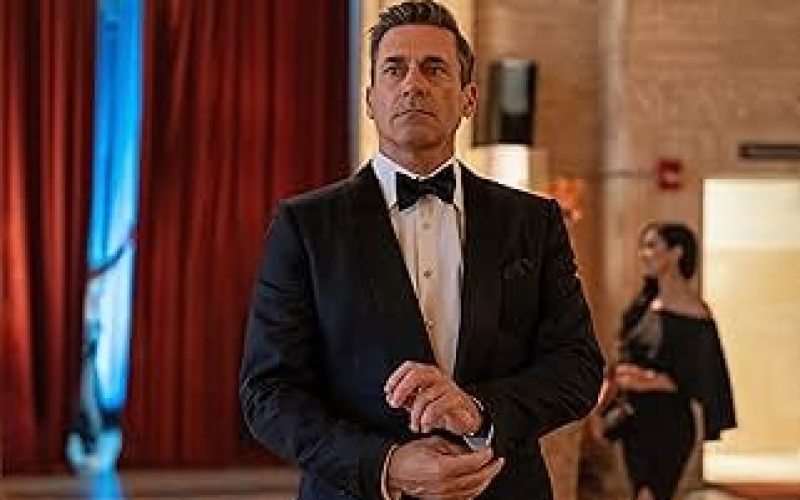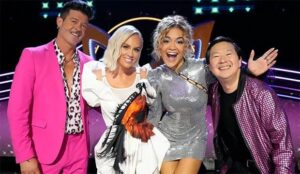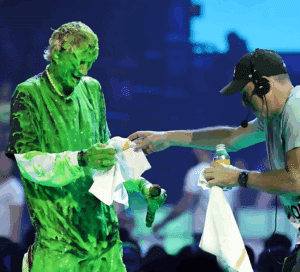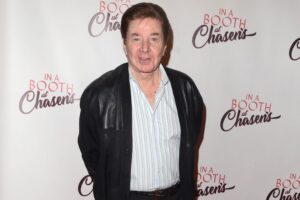Your Friends and Neighbors season 2 doesn’t just tie up loose ends, it practically yanks them into a knot and sets the whole thing on fire. Titled “Everything Becomes Symbol and Irony” (and boy, does it live up to that), the episode takes the central murder mystery we’ve been piecing together all season and smashes it wide open, revealing betrayals, blurred moral lines, and a lead character, Andrew “Coop” Cooper (Jon Hamm), spiraling deeper into darkness than most of us probably saw coming.
Samantha Frames Coop, for Everything
Let’s start with the gut-punch of Your Friends and Neighbors season 2: Samantha, the grieving wife who always seemed one step away from unraveling, turns out to be the puppeteer behind the whole mess. Not only was she tangled up in her husband Paul’s death, but she also coolly frames Coop, her secret lover, for murder.
Their relationship has been messy from the jump: secrets, guilt, desperation, and a shared sense of sinking fast. Coop’s been flailing ever since his divorce from Mel, losing money, purpose, and slowly his grip on doing the “right thing.” He slips into petty theft just to stay afloat, while Paul (already teetering) becomes paranoid and violent as his marriage collapses.
Things reach a fever pitch when Coop breaks into Samantha’s house and finds Paul dead. The evidence? All pointed right at him, murder weapon in his car, motive, opportunity, the works. It looks airtight. Coop’s facing life behind bars, and when offered a plea deal, he says no. Why? Because even if his life’s a mess, this? This wasn’t on him.
The Twist: Paul’s Death Wasn’t Murder, But It Was Manipulated
With some help from his ever-loyal friend Elena, Coop digs up the truth: Paul took his own life. The final straw? A brutal FaceTime call with Samantha, mixed with meds and alcohol. But here’s where it gets colder than cold: Samantha knew suicide meant no insurance payout. So she staged the scene, turned it into a “murder,” and threw Coop under the bus to make it stick.
The turning point comes when Coop and Elena find a hidden suicide note. It’s raw, tragic, and it blows Samantha’s whole scheme to pieces. She’s arrested. Coop is cleared. Case closed, right?
Not quite.
Coop Walks Free, But He’s Not Welcome Anymore
Even though Coop’s off the hook legally, he’s far from forgiven. One brutal scene at the country club, awkward silences, darting glances, forced smiles- makes it painfully clear: in the eyes of his old world, he’s still guilty. Maybe not of murder, but of something worse, being messy.
So when a hedge fund offers him a cushy, high-paying job, a supposed shot at redemption, Coop turns it down without blinking. He doesn’t want their approval anymore. He doesn’t want to pretend. Instead, he fully embraces the rogue he’s become. A gentleman thief. A man who’s stopped playing by the rules because he’s realized the game’s rigged anyway.
It’s a dark, oddly poetic choice. And in a show that thrives on irony and moral fog, it fits like a glove.
Critical Response: “Mad Men Meets Breaking Bad With a Wink”
Critics are loving the finale’s willingness to go there. Jon Hamm’s Coop feels like the spiritual cousin of Don Draper, haunted, charismatic, and constantly teetering between redemption and ruin. But this time, there’s no glossy ad agency or smooth exit. Just gray skies, bad choices, and stolen watches.
Of course, not everyone’s thrilled. Some fans were hoping Coop would turn a corner, find his better angels, and walk the straight and narrow. Instead, he stole the corner and drove off with it. But honestly? That’s what makes it good TV. Predictability’s overrated.
Your Friends and Neighbors Season 2: A New Life, or Just a New Lie?
With Samantha behind bars and Coop leaning hard into his new outlaw persona, Your Friends and Neighbors Season 2 promises a very different ride. Is this who Coop is now, or is he just playing the part because it’s easier than facing everything he’s lost?
The episode title, “Everything Becomes Symbol and Irony,” says it all. Nothing’s exactly as it seems. Everyone’s pretending. And maybe, just maybe, there’s a twisted kind of freedom in letting go of who you were supposed to be.








